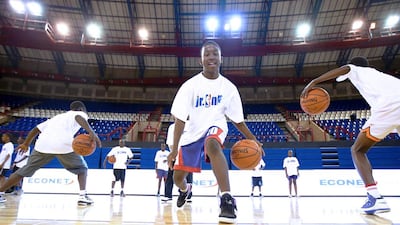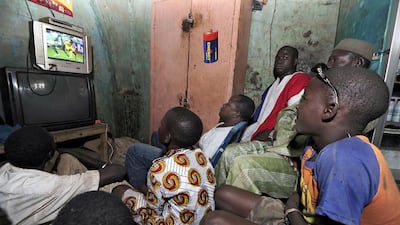Cape Town // When Manchester United and Crystal Palace square up for the FA Cup Final at Wembley tomorrow, many eyes will be on the Ivory Coast-born Palace and former United star Wilfried Zaha – but not that many in Africa.
Africa produces some of the world’s best athletes but few on the continent get to see them perform. This may change as new broadcasters emerge to create sports channels to serve African viewers.
While the continent’s wealthy get to watch global sport on satellite television, most others could, at best, crowd around a flickering screen streaming local football teams.
This is now rapidly changing. Broadcasters are waking up to the vast untapped demand for sports channels across the continent, attracting new entrants. One newcomer is Kwese Sports, part of the Zimbabwe’s Econet Wireless Group, a mobile service provider.
In recent months Kwese has acquired free-to-air broadcast rights for English Premier League Football for 50 countries across sub Saharan Africa. It has also signed up US National Basketball Association (NBA) rights.
“Sports are extremely popular among Africans and it makes sense to invest in sports content that will have wide ranging appeal,” says the Kwese spokesman Tshepo Mphela. The strong presence of its parent group Econet across African markets made a natural platform to build on.
The Premier League deal will allow Econet to screen Saturday afternoon football matches free-to-air, rather than via a subscription, a big departure from the norm. Econet will rely on advertising to recoup the revenue.
While football is an obvious draw, other sports are also included. Broadcasters are now beginning to consider more exotic activities which previously had little traction.
“African markets are increasingly being exposed to more content than ever before as access to the internet grows, and this has diversified taste in entertainment,” Mr Mphela says. Basketball was growing in popularity on the continent. “The NBA also has more African players than ever before and this is an opportunity to showcase these stars to audiences from their own lands.”
Still, it will be some time before new entrants such as Kwese threaten the dominance of the South African provider SuperSport. Several decades of operation across Africa and a strong relationship with rights holders give it an ongoing advantage, and it controls more than 60 per cent of African digital subscribers, says Themba Ndlwana, the founder of Sports Rights Africa, a UK firm specialising in broadcasting rights.
“SuperSport’s longevity in the market is a prime example for what needs to be done by sports TV platforms to be viable in the region,” Mr Ndlwana says. “Investments in both premium international rights and local or national sports has been the bedrock of their success.”
SuperSport itself has noted the new entrants and is likely to use its purchasing power to defend its market share. “SuperSport welcomes competition in the market, which will ultimately benefit the consumer,” says its spokesman Clinton van der Berg. “SuperSport’s view is that this focuses priorities on content that subscribers particularly want to consume.”
The newcomers will have to learn fast as competition increases. Startimes in Nigeria and Kenya’s Zuku, Tanzania’s Azam as well as the US titan Fox Sports, have entered the fray, the latter through Fox Sport Africa.
As the diversity of broadcasters grows, so will the variety of sports they offer. The finite number of premium properties will inevitably lead sports TV platforms to experiment and try new “exotic” or niche sports programmes which are mostly new to the African TV audience, Mr Ndlwana says.
“The general view is the young African middle class is diversified in its consumption of sports media content and is increasingly segmented through demographics and in their interest and taste for sports. This can only be good for the development of the market because a diversified sports TV economy will lead to a diversified and mature African sports economy.”
African sporting bodies also stand to gain. Doza Loue, a sports media consultant in London specialising in west Africa, said local leagues will inevitably gain. “Because not everyone will be able to afford and compete against the big players when it comes to premium rights, we will witness more and more broadcasters turning their attention toward local sporting events whose media rights are relatively affordable,” he says. “This will also allow specialised sports channels to fill their need in sports programming at a lesser cost while promoting national sporting competitions.”
The broadcaster RTI in the Ivory Coast, for instance, now focuses on the Ivorian football Ligue 1 rather than foreign sporting events, Mr Loue says.
While football reigns supreme – European leagues especially – regional tastes are likely to be increasingly served as the number of broadcasters proliferate.
“In Senegal, traditional wrestling is by far the number one sport with football second, while in Burkina Faso cycling has a huge following,” Mr Loue notes, while in former British colonies cricket and rugby enjoyed a large following.
While many are optimistic, the danger exists that newer entrants may try to expand to fast, too soon. Nigeria’s HiTV launched with great optimism in 2007 but collapsed just four years later.
“The cost of acquiring rights is astronomical and broadcasters must have a hard plan to recover these costs,” says Philip Leavesley, a Johannesburg-based legal consultant specialising in sports rights negotiation.
“Cost remains the real challenge because they need to generate revenue from paying viewers, advertisers or some other means.”
This is made more difficult because, although the African middle class is growing, only a small percentage of the population can afford a pay-per-view subscription. This in turn means broadcasting infrastructure itself is thin on the ground.
“Free-to-air is the cheapest model for most people but this means it cannot always support premium content. But for those who get it right, this is a growth market.”
business@thenational.ae




